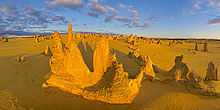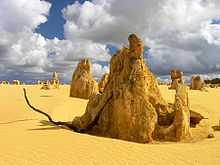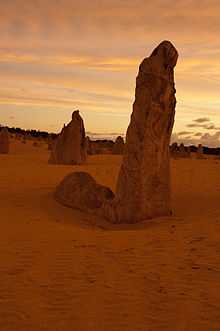The Pinnacles (Western Australia)

The Pinnacles are limestone formations contained within Nambung National Park, near the town of Cervantes, Western Australia, Australia.
Formation


The raw material for the limestone of the Pinnacles came from seashells in an earlier era that was rich in marine life. These shells were broken down into lime-rich sands that were blown inland to form high mobile dunes. However, the manner in which such raw materials formed the Pinnacles is the subject of debate and three mechanisms are proposed:
- They were formed from lime leached from sand subject to aeolian processes (wind-blown), and by rain cementing the lower levels of the dune into a soft form of limestone. Vegetation then formed an acidic layer of soil and humus, and a hard cap of calcrete developed above the softer limestone. Cracks in the calcrete were exploited by plant roots, while the softer limestone continues to dissolve and quartz sand fills the channels that form. The vegetation died and wind blew away the sand covering the eroded limestone, thereby revealing the Pinnacles.
- They were formed through the preservation of tree casts buried in coastal aeolianites, where roots became groundwater conduits, resulting in the precipitation of indurated (hard) calcrete. Subsequent wind erosion of the aeolianite then exposed the calcrete pillars.[1]
- On the basis of the mechanism that formed smaller “root casts” in other parts of the world, the third proposal suggests that plants played an active role in the creation of the Pinnacles. As transpiration drew water through the soil to the roots, nutrients and other dissolved minerals flowed toward the root—a process termed "mass-flow" that can result in the accumulation of nutrients at the surface of the root, if the nutrients arrive in quantities greater than that needed for plant growth. In coastal aeolian sands that consist of large amounts of calcium (derived from marine shells), the movement of water to the roots would drive the flow of calcium to the root surface. This calcium accumulates at high concentrations around the roots and over time is converted into a calcrete. When the roots die, the space occupied by the root is subsequently also filled with a carbonate material derived from the calcium in the former tissue of the roots, and possibly also from water leaching through the structures. Although evidence has been provided for this mechanism in the formation of root casts in South Africa, evidence is still required for its role in the formation of the Pinnacles.[2]
Tourism
The Pinnacles remained unknown to most Australians until the 1960s, when the area was dismissed to Nambung National Park.[3] The area receives over 250,000 visitors a year. A visitor precinct and interpretive centre was completed in March 2008.[4]
The best season to see the Pinnacles is spring from August to October, as the days are mild and wildflowers start to bloom. The pinnacle formations are best viewed in the early morning or late afternoon as the play of light brings out the colours and the extended shadows of the formations delivers a contrast that brings out their features. Most animals in the park are nocturnal, but emus and kangaroos can be seen during the daytime, more commonly in the evening or early morning.
In popular culture
The Pinnacles were featured in Billy Connolly's World Tour of Australia at the climax of an episode, he dances around them in the nude echoing an Aboriginal myth which relates to the Pinnacles. It was also featured in the musical number "Ye Jaan Le Le" in the 1997 Indian film, Daud, starring Sanjay Dutt and Urmila Matondkar.
Additionally, the music video for the song "Standing on the Shore" by Australian electropop duo Empire of the Sun, also featured The Pinnacles.
Several scenes in the 2009 Korean thriller movie A Million were filmed there.
References
- ↑ Hearty, P.J., O’Leary, M.J., 2008. Carbonate eolianites, quartz sands, and Quaternary sea-level cycles, Western Australia, A chronostratigraphic approach. Quaternary Geochronology 3, 26-55
- ↑ Cramer MD, Hawkins H-J. 2009. A physiological mechanism for the formation of root casts. Palaeogeography, Palaeoclimatology, Palaeoecology 274: 125–133
- ↑ M. Bright, 1001 Natural Wonders You Must See before You Die, Quintet Publishing, London 2005
- ↑ Nambung National Park (Pinnacles) NatureBase. Retrieved 2007-03-24.
Further reading
- Stephens, Alan.(1989) Pinnacles : Nambung National Park, Western Australia (photography, Alan Stephens - text, Sue Hughes) Mulgrave, Vic. : Nucolorvue Productions, ISBN 0-85858-106-X
External links
| Wikimedia Commons has media related to Nambung National Park. |
Coordinates: 30°36.35′S 115°9.45′E / 30.60583°S 115.15750°E